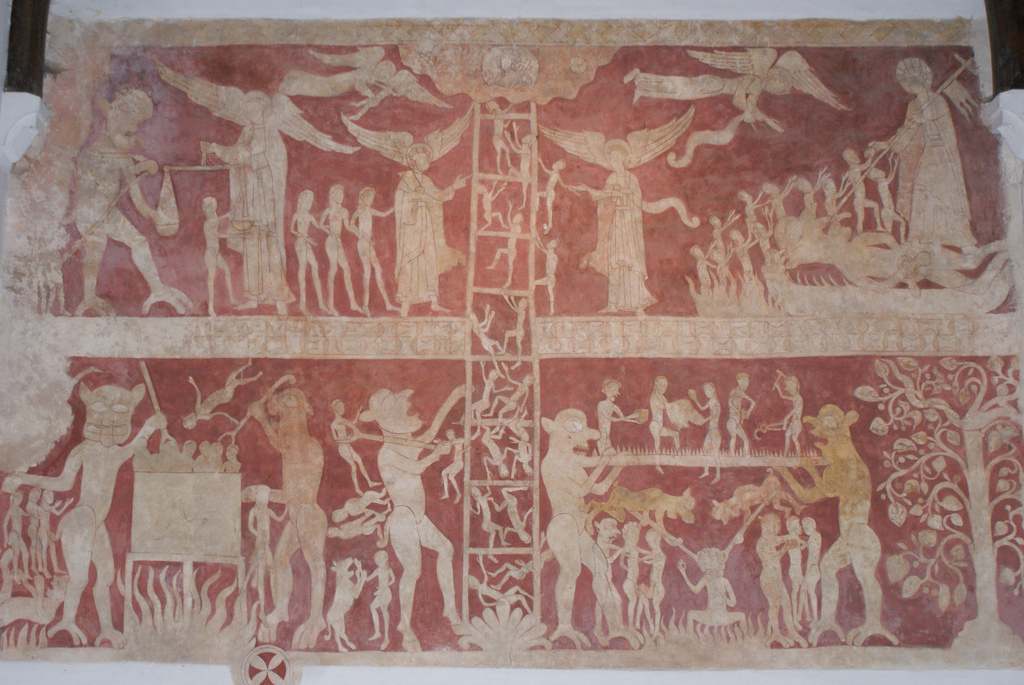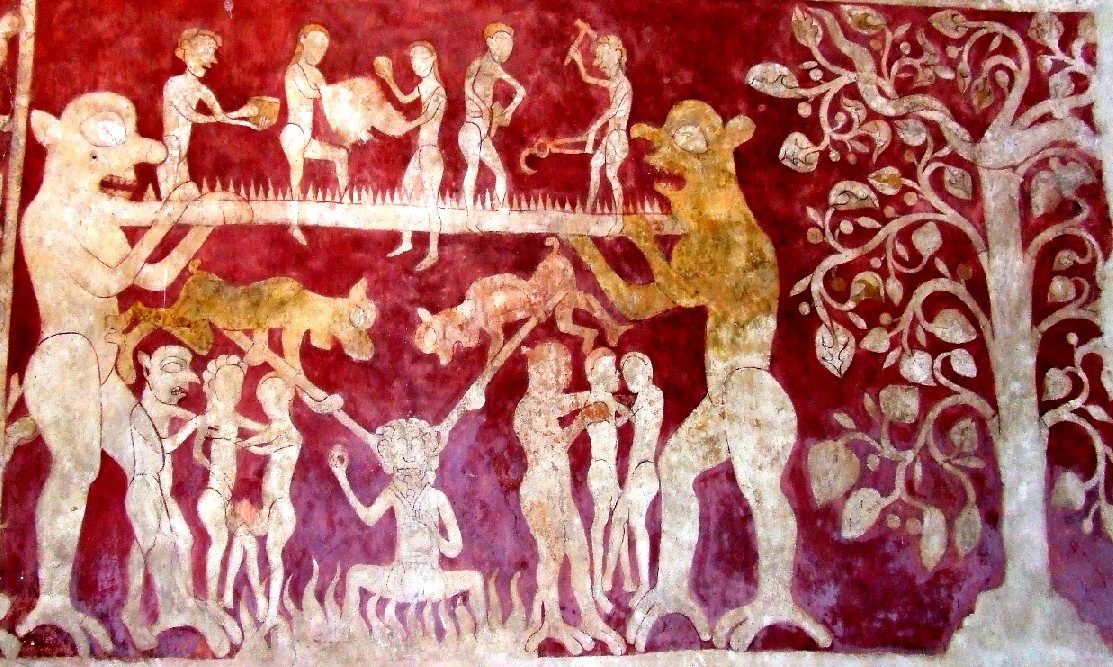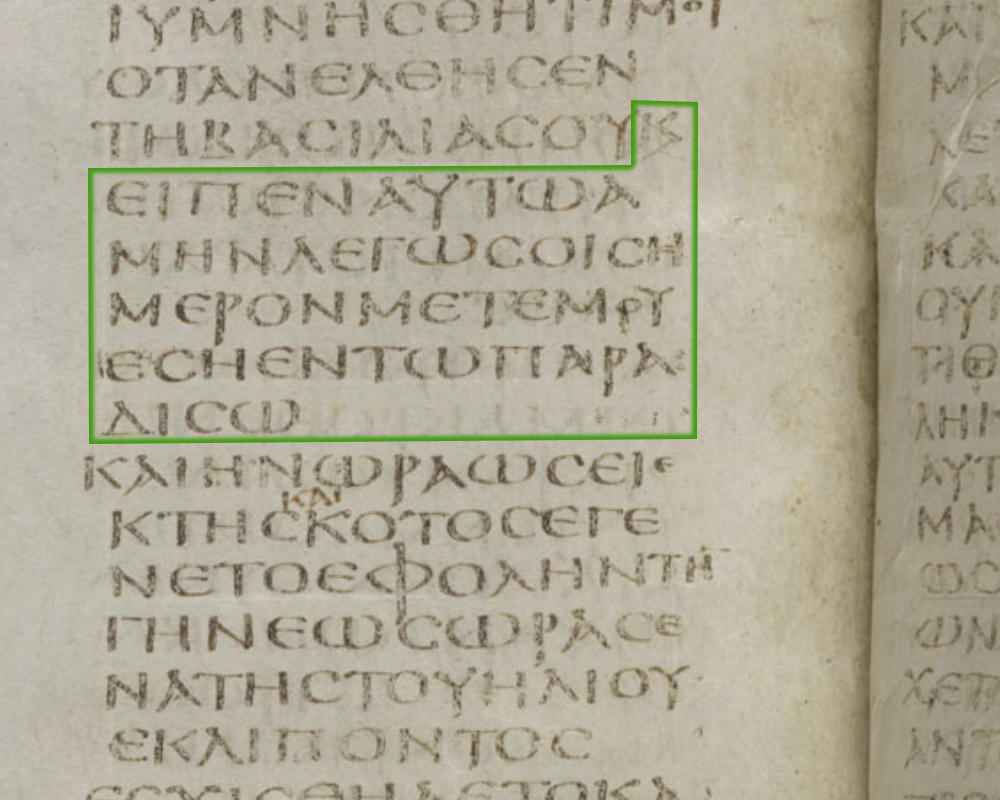Chapter 3
Rewards: Heaven or Hell?
In a medieval church near where I live there is a famous painting, dating from the twelfth century, that covers the wall at one end of the building (see below). It depicts in graphic detail the respective fates of the wicked and the righteous. The upper half represents heaven, into which the faithful are ushered by the angels. The lower half shows hell, where demons roast the wicked over fires or prod them as they stew in vats of boiling oil.

the ways of salvation and damnation.

Obviously, if people do not have an immortal soul that lives on at death and which therefore has to be sent somewhere, then belief in scenes such as this is a non-starter. I have already demonstrated that this is the case, but you may still have reservations because of ingrained beliefs and the frequent mention of hell in the Bible, together with some occasional allusions that might support heaven-going.
Many today would suggest that pictures such as the above were the product of a more superstitious and less tolerant age, when ignorant worshippers were frightened into obedience.
But the threat of dire punishment for the unfaithful in a burning hell was still being routinely taught until comparatively recent times. Charles Spurgeon (1834-92), a very prominent London preacher, made it a dominant feature of his sermons:
We do not care about metaphorical fires. But they are real, sir — yes, as real as yourself. There is a real fire in hell, as truly as you have now a real body — a fire exactly like that which we have on earth in everything except this — that it will not consume, though it will torture you. You have seen the asbestos lying in the fire red hot, but when you take it out it is unconsumed. So your body will be prepared by God in such a way that it will burn for ever without being consumed; it will lie, not as you consider, in metaphorical fire, but in actual flame.
Of recent years, such belief in hell fire and eternal torment of the wicked has been very much soft-pedalled. Even the Roman Catholic Church’s very long-standing belief in hell torments has been challenged by the current Pontiff, Francis, he said this in a speech in 2013:
The church no longer believes in a literal hell where people suffer
(What then of the papal infallibility
in doctrinal matters of previous centuries?)
But, you might say: “Are there not many references to hell throughout the Bible?” Yes, indeed! But the great majority of these use the word “hell” to describe nothing more than “the grave”. The English word originally denoted simply a “covering up”. It is derived from Old English hel, or helle (about 725), which comes from Proto-Germanic halja, meaning “one who covers up or hides something”, which is what one does when burying a body. It is interesting that the Hebrew word sheol, שְׁאוֹל is translated in the KJV as “grave” exactly the same number of times as it is “hell”, suggesting an equivalent meaning. So the occurrence of the word “hell” in the Bible does not normally denote a place of fiery torment, simply a hidden place, the grave.
The belief in hell-fire torments arose from a misunderstanding of an allusion of Christ. He said that the wicked go to hell, into the fire that shall never be quenched — where their worm does not die, and the fire is not quenched
.1
Jesus is here using a special word whose meaning his hearers would have easily understood, although many translations of the Bible do not indicate the distinction. This word is gehenna, γέεννα and refers to a specific place on the outskirts of Jerusalem. “Gehenna”, or “gehinnom” is composed of two Hebrew words, ge, גָּיְא meaning “valley” and hinnom, הִנֹּם, the name of a person connected with that place. This valley of the son of Hinnom
was immediately south of the walls of Jerusalem and is frequently mentioned in the Old Testament.2 In the days of the kings in Jerusalem this valley was used for horrific child sacrifices, when infants were burnt alive in a Tophet
sacrifice to the false gods.3
Jewish tradition reveals that in Christ’s day a burning rubbish heap in the Valley of Hinnom gave rise to the idea of a fiery place of judgement. They maintained that in this valley fires were kept burning perpetually (hence the not quenched
reference of Jesus) to consume the refuse of Jerusalem, including the corpses of criminals. The edges of this decaying rubbish attracted flies, whose maggots were continually present (hence where their worm does not die
). The point of this allusion is that nothing put into this conflagration would survive, and so Jesus used it as a symbol of the complete destruction of the unfaithful.
A similar symbol, the lake of fire
, is used in the Book of Revelation to describe the annihilation of the wicked for eternity.4
Thus, the “gehenna” hell of the New Testament is a symbol for the eternal complete destruction of the unfaithful, not a literal place of everlasting torment.
Going to heaven at death
Most of us have experienced intense sorrow at the loss of a loved one. The sorrow is even greater if it is a young person or a child. How often the mourners are consoled by the assurance that their dear ones are in a far better place.
In a stroll around my local cemetery I noted the following sentiments on the gravestones:
lf tears could build a stairway we’d walk right up to heaven and bring you home again
Death is only a shadow across the path to heaven
Our precious angel shining down on us from heaven
;As you play among the angels
As the bird free of its cage seeks the heights so the Christian soul in death flies home to God
Promoted to glory
Such sentiments are widely believed in most Christian communities and are supported by official church statements, as in the English Prayer Book.
It is impossible not to feel sincere sympathy with those whose loved ones have died. At such times all possible consolation needs to be offered to the bereaved. But, we ask, if heaven is the immediate reward at death, where is the direct statement of this fact in Scripture? Surely it would be the one thing that Christ and his Apostles would have preached and used to console mourners in their times of sadness.
The Apostle Paul faced this very situation in his day and spelt out very clearly the true Christian hope:
I do not want you to be ignorant, brethren, concerning those who have fallen asleep, lest you sorrow as others who have no hope.5
How, then, did he dispel their ignorance? Was it by telling them that their loved ones were in heaven? Not a bit of it! The hope he offered was that they would come to life again at the return of Jesus:
For the Lord Himself will descend from heaven with a shout, with the voice of an archangel, and with the trumpet of God. And the dead in Christ will rise first… Therefore comfort one another with these words.5
The consistent Bible teaching, as we have already seen is that we possess no immortal soul6; death is the end of all consciousness and the real Christian hope lies in resurrection.
One of the great Old Testament characters is David, termed by Scripture: A man after his [God’s] own heart
.7 He was the sweet psalmist of Israel
who rightly claimed that: the Spirit of the Lord spoke by me
.8 So what divine message of hope did David have for his readers? In a psalm contrasting the alternative fates of the righteous and the wicked he never mentions heaven, but repeatedly says that the reward for faithfulness will be on earth — that is, after a resurrection:
For evildoers shall be cut off; but those who wait on the LORD, they shall inherit the earth
9But the meek shall inherit the earth
10For those blessed by Him shall inherit the earth
11
In the New Testament this future reward on earth rather than in heaven is repeated by none other than Jesus himself, who in his famous Sermon on the Mount actually quotes these same words of David: Blessed are the meek, for they shall inherit the earth.
12
And to confirm that this is the correct understanding we have the words of the Apostle Peter, who specifically states that after he was dead and buried… David did not ascend into the heavens
13 If the man after God’s own heart did not go to heaven, how can we claim that lesser mortals do?
So we ask: how does this square with the opening prayer at the Christmas carol service which speaks of the redeemed being in heaven on another shore and in a greater light
?
As one who professes to follow Christ you must face up to this. You cannot have both views. If the Bible is right and the dead do not immediately wing their way to heaven, then the centuries—old belief as epitomised in that old church painting is a pious fable.
But what about…
But, you might say: Did not Christ speak of our
I would here like to refer back to my earlier comment, that if one approaches the Bible with pre-formed views it is sometimes possible to find support for them — but at the expense of the whole direction of the rest of Bible teaching.reward in heaven
and on the cross promised the thief immediate translation to paradise? And does not Paul refer also to our reward in heaven
and mentions his desire to depart and be with Christ
?
Great is your reward in heaven
So let’s look at some of these references. First, three with similar wording:
- Jesus said:
Rejoice and be exceedingly glad, for great is your reward in heaven
14 Go, sell what you have and give to the poor, and you will have treasure in heaven
15- Paul wrote:
The hope which is laid up for you in heaven
16
Undoubtedly, the reward at present is located in heaven, but there are two possible ways by which that reward might be reached — either by us going up to heaven, as so many Christians believe and teach, or by the reward coming down from heaven to us. The second possibility is what the Bible teaches. Jesus clearly stated that the reward would be given at his return to the earth: For the Son of Man will come in the glory of his Father with his angels, and then he will reward each according to his works.
17
The thief in paradise
But, you may say, What about the dying thief on the cross? Jesus said to him:
I say to you, today you will be with me in paradise.
18 Doesn’t that mean that the thief gained his reward that very day?
Let’s think carefully about this passage again, not jumping to conclusions. Where did Jesus and the thief actually go on the very day of their crucifixion? Was it to paradise (whatever that may mean)? No, it is quite clear that both went to the grave (the hell of the Bible) and Jesus stayed there for three days. Not much of an instant reward for Jesus or the thief.
Also notice that the thief said nothing about going to heaven. His request related to the future: Lord, remember me when you come into your kingdom.
He was not asking for immediate reward but for participation in some future event. He had probably heard Christ preaching about his future kingdom when paradise would be restored on earth and he was asking for a place in it. Jesus solemnly promised that his request would then be granted.
But
, you may continue, why did Jesus say,
The answer is quite simple. Many readers of the Bible do not know that in the Greek manuscripts there is NO punctuation, lowercase letters or even spaces between words (see image below). Christ’s words thus appear as: today
, suggesting that the thief would receive his reward the same day that he died?ISAYTOYOUTODAYYOUWILLBEWITHMEINPARADISE
This rarely is a problem for translators, but sometimes can lead to differences in punctuation. Christ’s reply to the thief is a case in point. It can legitimately be translated with the comma in a different place. Instead of, I say to you, today you will…
it could equally be: I say to you today, you will…
. This is more in keeping with the thief’s request. He wanted to be assured that at some future time (when you come into your kingdom
) he would be remembered. But Jesus tells him that he need not wait until then for such an assurance: he would give it to him there and then. Jesus comforted him that instant with the promise that he would definitely be rewarded when Christ’s future Kingdom comes.

Κ(ΑΙ)ΕΙΠΕΝΑΥΤΩΑΜΗΝΛΕΓΩΣΟΙΣΗΜΕΡΟΝΜΕΤΕΜΟΥΕΣΗΕΝΤΩΠΑΛΙΣΩ
Depart and be with Christ
Here are words from Paul’s pen that superficially seem to suggest an immediate transition at death. Whilst a prisoner in chains he wrote to the Colossians that although he would quite happily die for his faith, his continued presence would be of more benefit to them:
For to me, to live is Christ, and to die is gain… For I am hard-pressed between the two, having a desire to depart and be with Christ, which is far better. Nevertheless to remain in the flesh is more needful for you.19
As with other similar references, the crucial point relates to the timing. Paul is not saying that after his death he will immediately be with Christ. We must allow Paul to be consistent in his writings. Later on in the very same epistle he unambiguously spells out that his hope for the future was not immediately at his death but at the return of Jesus to the earth to give him immortality:
For our citizenship20,21 is in heaven, from which we also eagerly wait for the Saviour, the Lord Jesus Christ, who will transform our lowly body that it may be conformed to his glorious body, according to the working by which he is able even to subdue all things to himself.22
Thus, Paul’s hope was centred on the return of Jesus. But he also knew that as death resulted in complete unconsciousness, the transition to the presence of Christ in effect would appear to be immediately at his death. At his next conscious moment he would be with Christ
.
Thus, we cannot use this isolated reference by Paul (and there is a similar one in his letter to the Corinthians23) to go against his own clear teaching and indeed the whole of scriptural revelation on the topic.
In my Father’s house…
Another frequently quoted passage to support heaven—going at death is Christ’s reference in John 14:
In My Fathers house are many mansions; if it were not so, I would have told you. I go to prepare a place for you.24
Here, it is assumed that My Father’s house
refers to heaven.
But Jesus never used this term to describe heaven. On the only previous occasion when he used My Father’s house
it referred to the temple in Jerusalem25 So, here again, to suggest that this teaches heaven—going at death is something based on a prior assumption. Bible teaching is that God’s house is not heaven but is a spiritual building made up of the faithful believers. The Apostle Peter says:
You also, as living stones, are being built up a spiritual house, a holy priesthood, to offer up spiritual sacrifices acceptable to God through Jesus Christ.26
Jesus promises: He who overcomes, I will make him a pillar in the temple of my God.
27 The Apostle Paul makes a similar reference:
Now, therefore, you are… built on the foundation of the apostles and prophets, Jesus Christ himself being the chief cornerstone, in whom the whole building, being fitted together, grows into a holy temple in the Lord, in whom you also are being built together for a dwelling place of God in the spirit.28
Christ is not promising that his going to heaven is to prepare a place into which the believers can follow. Rather, Jesus is saying that whilst in heaven he is preparing this world and his followers for inclusion in the community in which God will dwell. Note that Jesus then goes on to say that this union with him will take place at his second coming:
And if I go and prepare a place for you I will come again and receive you to myself; that where I am, there you may be also.29
We must not base a belief on the first phrase and ignore the second.
I am truly sorry if looking at this topic has dashed some fervently held hopes. But as a twentieth—century psychologist once said in a different context: illusions commend themselves to us because they save us pain and allow us to enjoy pleasure instead. We must therefore accept it without complaint when they sometimes collide with a bit of reality against which they are dashed to pieces.
30